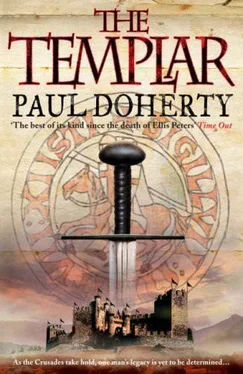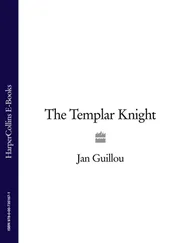P. Doherty - The Templar
Здесь есть возможность читать онлайн «P. Doherty - The Templar» весь текст электронной книги совершенно бесплатно (целиком полную версию без сокращений). В некоторых случаях можно слушать аудио, скачать через торрент в формате fb2 и присутствует краткое содержание. Год выпуска: 2010, ISBN: 2010, Издательство: Minotaur Books, Жанр: Исторические приключения, на английском языке. Описание произведения, (предисловие) а так же отзывы посетителей доступны на портале библиотеки ЛибКат.
- Название:The Templar
- Автор:
- Издательство:Minotaur Books
- Жанр:
- Год:2010
- ISBN:9780312576837
- Рейтинг книги:5 / 5. Голосов: 1
-
Избранное:Добавить в избранное
- Отзывы:
-
Ваша оценка:
- 100
- 1
- 2
- 3
- 4
- 5
The Templar: краткое содержание, описание и аннотация
Предлагаем к чтению аннотацию, описание, краткое содержание или предисловие (зависит от того, что написал сам автор книги «The Templar»). Если вы не нашли необходимую информацию о книге — напишите в комментариях, мы постараемся отыскать её.
The Templar — читать онлайн бесплатно полную книгу (весь текст) целиком
Ниже представлен текст книги, разбитый по страницам. Система сохранения места последней прочитанной страницы, позволяет с удобством читать онлайн бесплатно книгу «The Templar», без необходимости каждый раз заново искать на чём Вы остановились. Поставьте закладку, и сможете в любой момент перейти на страницу, на которой закончили чтение.
Интервал:
Закладка:
She tried to curb the wave of self-pity and stared round the tent. They had left Constantinople seventy thousand strong; now they were fewer than fifty thousand. A long trail of funeral crosses and burial mounds stretched back across Asia. An army of ghosts must now march with them. She closed her eyes briefly and gave thanks that at least those dear to her had survived. Hugh and Godefroi, Alberic and Norbert, Theodore, Beltran and Imogene, but, she stared swiftly around, they were all now grey people: grey-haired, grey-faced, grey-souled, ekeing out a grey existence in that sinister half-light of the year before the brooding mass of Antioch. Again Eleanor tried to check herself. There were those other grey shapes left along the dusty highways and roads. Little wonder wolves had come down boldly to the gruesome feast provided. Lions, scenting the rotten smell of decaying flesh, had slunk close. Bears abandoned their lairs for the feast and dogs the hovels they lived in, filthy beasts, soon joined by every creature that could smell carrion-tainted corruption from afar. Vultures, shadowy flocks of them darkening the sky, became their constant companions. These foul birds of the air so filled their bellies they grew too fat for flight, so trees, bushes and gorse became sprinkled with gore from their feathers whilst bits of putrid flesh and drops of blood fell on the trudging column. Were they cursed? Eleanor recalled passing a crumbling graveyard. She forgot which village in which province, they all seemed the same now, but she certainly remembered that one! A hag, a crone crawled out from between the rotting masonry of a cemetery; she was scrawny and squalid, her hair all matted and tangled. She danced round on the top of a table tomb screaming curses in a screeching voice until some unknown archer loosed an arrow straight through her throat. They left her sprawled in a pool of blood. No one cared, but had they killed a witch?
‘Eleanor? Eleanor?’
She glanced up. Hugh, eyes all red-rimmed, stared down at her. She shook her head and got to her feet. Her brother grasped her hands.
‘Eleanor, you are looking well!’
‘Brother,’ she joked, ‘no better than you.’
‘This siege must be broken!’
‘How?’ she retorted. ‘Shall we sprout wings and fly?’
Hugh released her hands, murmured something about Bohemond and walked away. Eleanor closed her eyes and whispered a quick prayer. She’d been too harsh. They were all hungry, cold and wearied. For a few moments she thought of other Christmases in their manor house at Compiègne: the crackling logs, the sweet smell of fresh meat, of goblets brimming with wine.
‘I must stop it!’
‘Stop what, mistress-sister?’
Eleanor opened her eyes. Simeon the Scribe was staring at her.
‘I must have some meat,’ she retorted.
‘Not human flesh?’ he joked. ‘Mistress, we should retire.’
She followed Simeon out of the tent and through the silent, cold camp. Here and there cooking fires flickered. Men, women and children grouped around seeking warmth and food. Standards, dirty and tattered, fluttered on poles. Eleanor glanced away. The very sight of her companions deepened her depression, the darkness in her own soul. When she reached her own tent, she asked where Imogene was.
Simeon shrugged. ‘The same place! Beltran knows where food is. So, where food and Beltran are, Imogene always follows.’
Eleanor sat down on the soaked cushions. Simeon cut their freshly cooked meat into small pieces, placed some on a scrap of parchment and handed them to her.
‘Eat, mistress, and look.’ He opened his leather jerkin, taken from a dead soldier, and pulled out a small wineskin. For a while, they sat sharing this between them. Simeon busied himself lighting a small fire, gathering twigs, pieces of rubbish to burn. The smoke smelt foul, but the weak flames provided some warmth.
‘Mistress, why not return to the chronicle? It is better than sitting here staring into the flames. I tell you, more souls have been lost looking into fires…’
Eleanor, feeling better after the meat and wine, even though her stomach now hurt, nodded in agreement.
‘It’s best,’ she whispered. ‘Yes, it’s best…’
They made themselves as comfortable as possible. Simeon, Eleanor reflected, had become very useful. Again she cursed her bitterness. Simeon was a friend. He’d told her a little about his life. How he’d lost one wife full of fever whilst his second wife and young son had been captured by Turkish bandits.
‘God knows where they are, mistress,’ he’d remarked. ‘Perhaps one day…’
She realised that Simeon too carried his own book of sorrows, his own bag of pain. The scribe had become an expert at filching food, even the odd little luxury. He had responded to her protection with deep loyalty. He had also persuaded her to talk, describe what they had been through, insisting that she continue to write her memories down.
‘Others are doing it,’ he pointed out. ‘Stephen of Blois writes copious, detailed letters to his wife.’
The depredations of the march and this long, dreadful siege had certainly curbed Eleanor’s enthusiasm for reflection, for memories. Simeon tried to prompt her with news, scandal, rumours and gossip. She recalled Hugh’s warning about a traitor, a spy, but as Simeon had pointed out, the Turks had a legion of spies throughout the camp. They would certainly be busy collecting news about the condition of the Franks, which would make the hearts of those in Antioch rejoice. Ugly rumours were also being spread. How an army was gathering in Egypt to march, pin the Army of God against the walls of Antioch and utterly destroy it. More importantly, Simeon’s sharp observations about religion had begun to influence Eleanor’s own attitude, though not her faith. She still believed in the power of the Mass, the Eucharist, prayer and the need to be shriven of one’s sins. Nevertheless, during the journey she had begun to question the truth about the Army of God and Urban’s great vision. Deus vult! Did God really want this? she wondered. Death, cruelty, rape and rapine? The barbarous greed of their leaders, lords constantly fighting amongst themselves over which cities and towns they should hold?
‘Mistress,’ Simeon intervened. ‘Dorylaeum, we left Dorylaeum, remember? It was the height of summer…’
They’d left chanting the Veni Creator Spiritus, which was just as well, Eleanor reflected, for they needed all the help God could give them. The leaders had decided to keep the Army of God together even though this meant foraging for food and water became more intense. The taste of victory soon turned sour as they trudged in the wake of the Turkish army, which had already devastated the bleak countryside with fire and sword. The only comfort was that they met no opposition. The Franks had replenished their armouries with lances, axes, swords and maces; these, together with their great oval shields, were slung on the carts from where women and children, silent now, stared sorrowfully around at the burnt villages and the blackened crops of wheat, barley and millet they passed. Hunger and thirst soon stalked the Army of God. The vultures became busy again, their great white-haired heads constantly blood-stained. They shadowed the army like a host of demons. Beneath them floated the hawks, kites, buzzards and fantail crows that also gathered eager for the feast of flesh. Wells and cisterns had been deliberately polluted. Eleanor approached one, leaned over its crumbling wall and stared in horror at the severed head of the camel floating there, its dirty grey hair all fly-infested, yellow teeth bared, bloodshot eyes glaring, the murky slime from its severed neck fouling the water. Other horrors affected them. Hordes of flies and reptiles that swarmed out of the undulating yellow hills and deep dusty hollows on either side of their route. Black-red dragonflies, yellow-black hornets and strange lizards, that kept changing colour from a dusty grey to a muddy red as if some mysterious angry fire burnt inside. Such creatures were their constant companions. All these frightened them whilst myriads of pot-bellied black flies wriggled into mouths, noses and ears or crawled under collars or cuffs to torture their sweat-soaked bodies. Around them the landscape stretched bare. The peasants and farmers had fled. Only occasional scouts were glimpsed, bearded men in evil-smelling goatskins riding shaggy hill ponies and armed with long tufted lances. No one could tell whether they were Turks or simply local inhabitants, for they scattered like quail under the shadow of a hawk when the knights rode out to meet them.
Читать дальшеИнтервал:
Закладка:
Похожие книги на «The Templar»
Представляем Вашему вниманию похожие книги на «The Templar» списком для выбора. Мы отобрали схожую по названию и смыслу литературу в надежде предоставить читателям больше вариантов отыскать новые, интересные, ещё непрочитанные произведения.
Обсуждение, отзывы о книге «The Templar» и просто собственные мнения читателей. Оставьте ваши комментарии, напишите, что Вы думаете о произведении, его смысле или главных героях. Укажите что конкретно понравилось, а что нет, и почему Вы так считаете.












